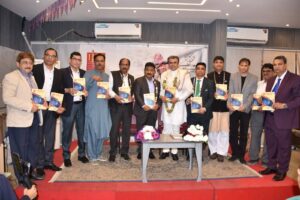
Representational Image
By: Syed Zia ur Rahman YaHind.Com
New Delhi, September 20, 2025: In a bold and controversial policy shift, the United States government has introduced a staggering $100,000 annual fee for H-1B visa applications, a move that is poised to reshape the landscape of international skilled labor migration, particularly impacting India’s booming IT sector. The executive order, signed by President Donald Trump in a late-night announcement from the White House, mandates that employers pay this fee for each year of the visa’s validity, potentially amounting to $300,000 over the standard three-year period, with extensions incurring additional costs.
The policy, effective immediately for new applications and renewals starting October 1, 2025, is framed by the administration as a necessary measure to “protect American workers and ensure the integrity of our immigration system.” According to a White House press release, the fee hike targets what officials describe as “widespread abuse” of the H-1B program, including instances where companies allegedly displace U.S. workers with lower-paid foreign talent. “This is about putting America first,” Trump stated during a brief Oval Office address. “We’ve seen too many loopholes exploited by big corporations at the expense of our own people. This fee will make sure only the truly essential hires come through—and they’ll pay their fair share.”
The H-1B visa, introduced in 1990 under the Immigration Act, allows U.S. companies to employ foreign workers in specialty occupations requiring theoretical or technical expertise, such as IT, engineering, and medicine. Annually capped at 85,000 visas (65,000 general plus 20,000 for advanced degree holders), the program has been a lifeline for Indian professionals, who consistently secure over 70% of approvals. In fiscal year 2024, Indian nationals received approximately 60,000 H-1B visas, fueling the operations of tech giants like Google, Microsoft, and Amazon, as well as outsourcing firms from India.
Prior to this hike, application fees were relatively modest: a base filing fee of $460, plus additional charges like the $1,500 training fee for larger employers and optional premium processing at $2,805. The new $100,000 per-year levy represents a seismic increase, dwarfing these costs and introducing an unprecedented financial barrier.
India’s $200 billion IT and business process management (BPM) sector, which employs over 5 million people and generates significant revenue from U.S. clients, is reeling from the announcement. Companies like Tata Consultancy Services (TCS), Infosys, Wipro, and HCL Technologies—collectively known as the “Indian IT majors”—have long relied on H-1B visas to deploy engineers and consultants onsite for client projects. Analysts estimate that these firms could face an additional $5-10 billion in annual costs if they maintain current staffing levels.
Nasscom, the National Association of Software and Service Companies, issued a strongly worded statement condemning the policy. “This exorbitant fee introduces unprecedented uncertainty and could severely disrupt the global delivery model that has driven innovation and economic growth for both nations,” said Nasscom President Debjani Ghosh. “We urge the U.S. administration to reconsider this draconian measure, which risks straining the strategic Indo-US partnership.”
Smaller Indian startups and mid-sized firms may be hit hardest, as the fee could render H-1B sponsorship economically unviable. “For a startup with razor-thin margins, $100,000 per employee is a death knell,” explained tech entrepreneur Priya Singh from Bengaluru. “We’ll have to pivot to remote work or local hiring in the U.S., but that defeats the purpose of accessing specialized talent pools.”
Beyond economics, the policy could exacerbate brain drain concerns in India, where skilled graduates often view H-1B as a gateway to global opportunities. With over 300,000 Indians currently in the U.S. on H-1B visas, many of whom are in the lengthy green card backlog, this fee might deter future applicants and prompt existing holders to explore alternatives in Canada, Australia, or Europe.
Economists warn that the fee could stifle U.S. innovation by limiting access to global talent amid a domestic skills shortage in STEM fields. A report from the Brookings Institution earlier this year highlighted that H-1B workers contribute disproportionately to patents and startups, with Indian-origin entrepreneurs founding companies like Zoom and Hotmail. Critics, including tech industry leaders like Elon Musk and Satya Nadella, have previously argued against restrictive policies, emphasizing that “talent knows no borders.”
On the diplomatic front, the Indian government has expressed “deep concern.” External Affairs Minister S. Jaishankar tweeted: “Monitoring the U.S. H-1B fee hike closely. Will engage with counterparts to safeguard interests of Indian professionals.” Sources in New Delhi indicate that Prime Minister Narendra Modi may raise the issue during upcoming bilateral talks, potentially linking it to trade negotiations under the Indo-Pacific Economic Framework.
Opposition in the U.S. is mounting too. Democratic leaders, including Senate Minority Leader Chuck Schumer, labeled the order “xenophobic and shortsighted,” vowing to challenge it through congressional oversight or legal action. Immigration advocacy groups like the American Immigration Council argue that the fee discriminates against smaller employers and violates equal protection principles.
The U.S. Citizenship and Immigration Services (USCIS) has outlined implementation details: Fees must be paid upfront via electronic transfer, with refunds only in cases of denial. Exemptions apply to certain non-profits, universities, and cap-exempt petitions, but these cover a minority of applications. Legal experts predict a surge in lawsuits, citing potential violations of the Administrative Procedure Act for bypassing public comment periods.
For aspiring H-1B applicants, the lottery system remains unchanged, but the financial hurdle could reduce overall submissions. “This isn’t just a fee—it’s a filter,” noted immigration attorney Rahul Batra. “Only the wealthiest companies will play.”
As the world watches, this policy underscores the ongoing tension between protectionism and globalization in the post-pandemic era. YaHind.Com will continue to track developments, including reactions from the Indian diaspora and potential countermeasures.
Sources: Agencies



